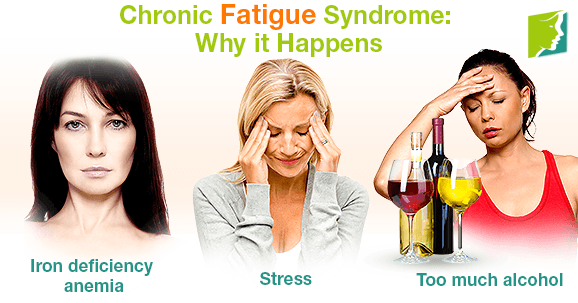Chronic fatigue syndrome (CFS) is a condition characterized by relentless exhaustion that does not disappear even after sleep or rest. Chronic fatigue syndrome is sometimes referred to as ME, which stands for myalgic encephalomyelitis. It should be treated as soon as possible, as the long- can be disability.
As the actual underlying cause of chronic fatigue syndrome itself is not completely understood, treatments often focus on symptom relief. The conditions that seem to lead to chronic fatigue syndrome are many, but there are some common patterns regularly. Read on to discover more about chronic fatigue syndrome.
How it Affects Life?
Chronic fatigue syndrome can range from mild to severe, with one in four sufferers experiencing it in its most severe form. Mild chronic fatigue syndrome is a tiredness that does not go away, but it does not prevent the sufferer from looking after themselves or carrying on with daily life, although they might need days off work to rest.
A moderate form includes disturbed sleep patterns and excessive napping during the day. Some reduced mobility might occur, but not always. However, severe chronic fatigue syndrome means the sufferer can carry out minimal tasks, but has drastically reduced mobility, sometimes rendering it impossible to get out of a chair, for example. Concentration difficulties will also naturally follow.
What Causes it?
While researchers have NOT pinpointed the precise cause of CFS, there are many factors that can contribute to it or amplify the symptoms. These include:
Iron deficiency anemia
A lack of iron in the diet is one of the leading causes of chronic fatigue syndrome. In fact, excessive tiredness is often the first sign that you have iron deficiency anemia. The reason it causes fatigue is because iron is one of the nutrients responsible for producing red blood cells, and if an insufficient amount is being produced, then oxygen cannot be efficiently transported around the body. As a result, the major organs are not functioning to their full capacity, and so an energy deficit is a natural consequence.
Stress
Stress can cause chronic fatigue syndrome simply on account that it uses a lot of energy. The stress response has biologically evolved to be a short-term response to immediate threats, and should disappear once the threat has been dealt with. However, in modern life, chronic stressors mean the body is in a constant state of high alert, and so bodily systems, such as the immune system, are repressed in order to focus attention on the problem at hand. As the immune system is responsible for providing a feeling of vigor, this can also affect energy levels.
Too much alcohol
Alcohol is a natural depressant, and a low mood can disturb sleep patterns. Too much alcohol can lead to negative thought patterns, which will often keep the sufferer awake. As a consequence, sleep is often too short or unrefreshing, which can lead to the onset of excessive worry. These will lead to further sleep loss and a lower mood, potentially leading to chronic fatigue syndrome.
CFS can feel difficult to treat because of its uncertain causes. However, in some cases, eliminating certain factors and making a few lifestyle adjustments can improve symptoms and get you back on your feet again.
Sources
- National Health Service UK. (2013). 10 medical reasons for feeling tired. Retrieved September 23, 2014, from http://www.nhs.uk/Livewell/tiredness-and-fatigue/Pages/medical-causes-of-tiredness.aspx
- National Health Service UK. (2013). Chronic fatigue syndrome - Treatment. Retrieved September 23, 2014, from http://www.nhs.uk/Conditions/Chronic-fatigue-syndrome/Pages/Treatment.aspx
- National Health Service UK. (2014). Iron deficiency anaemia. Retrieved September 23, 2014, from http://www.nhs.uk/conditions/Anaemia-iron-deficiency-/Pages/Introduction.aspx
- National Health Service UK. (2013). Why am I tired all the time? Retrieved September 23, 2014, from http://www.nhs.uk/Livewell/tiredness-and-fatigue/Pages/why-am-I-tired.aspx
- Panconesi, A. et al. (2012). Alcohol as a dietary trigger of primary headaches: what triggering site could be compatible? Neurological sciences, 33 Suppl 1, S203-5. doi: 10.1007/s10072-012-1068-z
- University of Notre Dame. (2008). Effects of Alcohol. Retrieved September 23, 2014, from http://ucc.nd.edu/self-help/alcohol-addiction/effects-of-alcohol/



